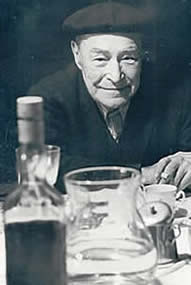Biography
1966-1981
Notes de capvesprol - "The 'Evening Sea Breeze' Notes"
For varying reasons, the literary project with Editorial Selecta (publishers) did not succeed. After a few years without an editor, Pla signed an exclusive contract with Editorial Destino (publishers), directed by Josep Vergés from Palafrugell, to be able to edit a new version of his Obra Completa(Complete Works). The first volume of the complete works is an unpublished book called El quadern gris (The Grey Notebook), a real synthesis of Pla’s work. Later on, there would be other unpublished books, autobiographical narrations, new travel books, collections of articles, etc. The recognition of his complete works on the part of the critics reflected the unconditional support from thousands and thousands of readers of all generations, of all sorts of ideologies and from all over Catalonia. Since 1925, at the latest, they had been following the evolution of his works with real fervour.
Critical and public popularity was immediately accompanied by the publication of his entire Obra Completa (Complete Works), what the writer considered to be his definitive work. However, his political position and provocative attitude separated Pla, during the last Francoist years, from the most progressive sectors of Catalan culture, who regarded his reticence about the democratic transition and the re-establishment of Catalan autonomy as incomprehensible. In spite of all that, the recognition of Josep Pla’s works as being one of the most valuable contributions to Catalan culture became unquestionable: thirty thousand pages of Catalan prose are the most fruitful example of contemporary Catalan literature.

Mas Pla. Llofriu, 1979. © Francesc Català-Roca.
Fundació Josep Pla.
1966
He starts his complete works with El quadern gris (The Grey Notebook) with Editorial Destino (publishers). He travels to the Canary Islands and South America. He also travels to Holland, Germany, France and Switzerland, as well as Sueca and Xàtiva. He returns to Buenos Aires.
1967
He makes some short trips to Majorca and Athens. He is awarded the Medalla d’Or de la Diputació de Girona (the Gold Medal from the Girona City Council). He also receives the Crítica Serra d’Or prize for El quadern gris (The Grey Notebook).
1968
He travels to Leipzig.
1969
He travels to Moscow and Northern Europe. Later, he visits Cantabria, the Basque country and Portugal. Omnium Cultural inaugurate the prestigious El Premi d’Honor de les Lletres Catalanes (Prize of Honour for Catalan Literature) whose jury each year refuses to award Pla the prize. This was to provoke periodic controversy until after his death.
1971
In August, he suffers a light heart attack but fortunately, he recovers without any problems. The constant displays of admiration give testimony to his increasing popularity.
1973
He donates a huge part of his library and sets up the Foundation which bears his name. He receives the well-known prize Crítica Serra d’Or for his book El que hem menjat (What we have eaten).
1975
The Prince and Princess of Spain, Juan Carlos and Sofia, visit his home “El mas Pla”. He is awarded La Medalla d’Or de la Província de la Diputació de Barcelona (Gold Medal of the Province from the Barcelona City Council).
1976
He ends his contribution to the magazine “Destino”.
1977
Once more, he is awarded the Crítica Serra d’Or prize for his work Articles amb cua (Articles with Tail).
1979
He is awarded the Premi Ciutat de Barcelona (City of Barcelona prize) for his work Notes del Capvesprol (The ‘Evening Sea Breeze’ Route). Ramon Sala, a delegate of the political party “Convergència Democràtica”, launches a controversial campaign to pay tribute to Josep Pla’s literary works.
1980
Josep Tarradellas awards him La Medalla d’Or de la Generalitat (The Gold Medal of the Catalan Parliament). Joan Coromines, in his acceptance speech for la medalla d’or which he has also received from the Generalitat, vindicates the writer. Pla is awarded the Crítica Serra d’Or for his work Notes del capvesprol (The ‘Evening Sea Breeze’ Route).
1981
He dies on April 23, at the age of 84 leaving 38 volumes of his Obra Completa (Complete works) published and some other unpublished works are released posthumously.